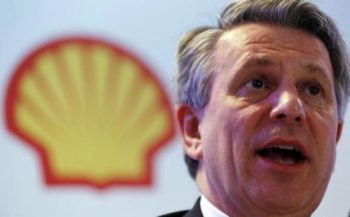
Royal Dutch Shell on Tuesday announced plans to resume all-cash shareholder dividends, as group profitability improves thanks to recovering oil prices and cost-cutting.
The announcement to scrap the three-year-old scrip dividend programme, that saw payments made in cash and shares, was made alongside news that the Anglo-Dutch group has raised its cash flow outlook and a target for reducing Shell’s carbon footprint.
It meanwhile confirmed a share buy-back programme of at least $25bn (21 billion euros) through to 2020, subject to its progress with reducing debt and further recovery in oil prices.
Shell said in a statement that “the strength of its balance sheet, coupled with stronger cash flow and a relentless focus on capital efficiency, discipline and flexibility, have given the company the confidence to cancel the scrip dividend programme”.
It meanwhile raised its annual cash flow to between $25bn and $30bn, up $5.0bn.
Shell’s Chief Executive “Ben van Beurden has delivered an early Christmas present for Shell shareholders”, noted Nicholas Hyett, Equity Analyst at stockbroker Hargreaves Lansdown.
“Improved cash generation has allowed the group to scrap the scrip dividend, with the debt position improving steadily as well. The extra shares issued under the scrip are set to be swept back up by a $25-billion share buyback over the next three years.”
Shares in Shell rallied more than three percent as investors welcomed the news, helping to guide the London stock market higher.
Shell and its rivals are benefitting from a recovery in oil prices, with Brent North Sea crude recently hitting a two-year high above $60 per barrel.
The company is meanwhile set to benefit from a controversial decision by the Dutch government to scrap a tax on dividends to help retain and promote foreign investment in The Netherlands.
Dutch Prime Minister Mark Rutte has cited Brexit as one of the most important reasons for the country to remain an attractive place of business for foreign companies and shareholders — and has proposed to axe the 15-percent tax.
But Rutte and his four-party coalition government have come under fire from opposition parties for deciding to cancel the dividend tax in 2019.
Agency Report